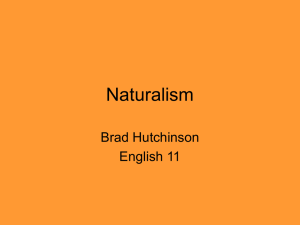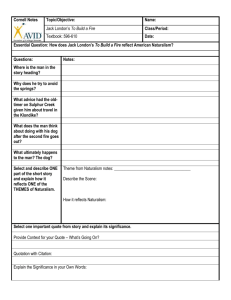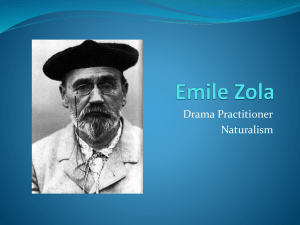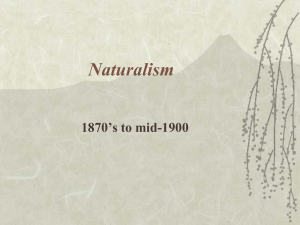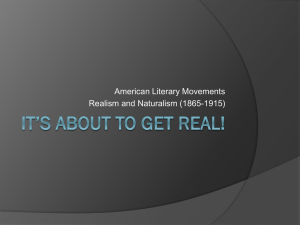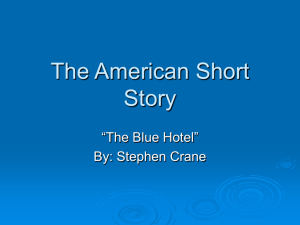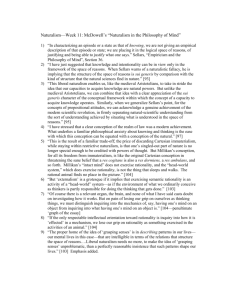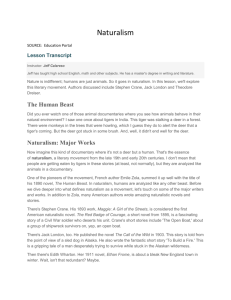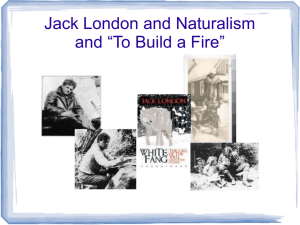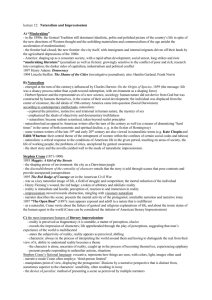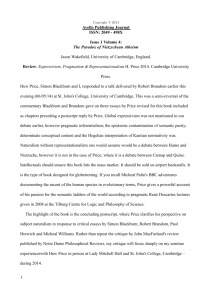Naturalism-1leroro
advertisement
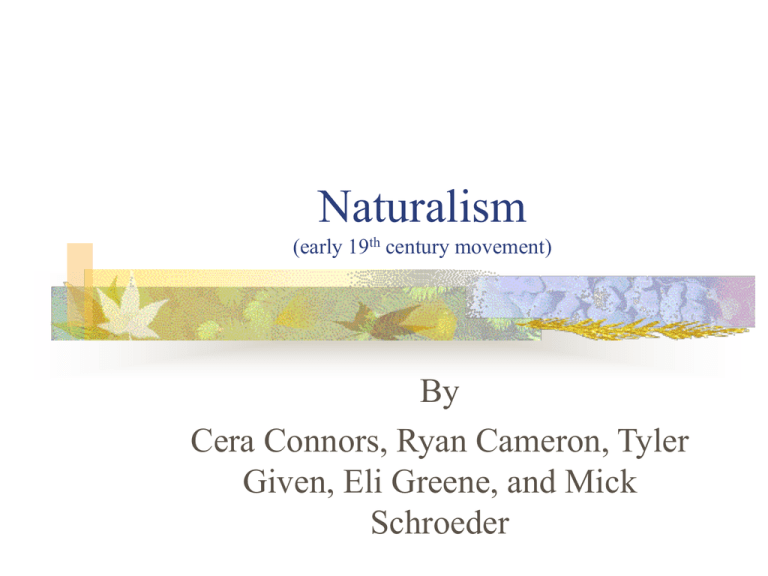
Naturalism (early 19th century movement) By Cera Connors, Ryan Cameron, Tyler Given, Eli Greene, and Mick Schroeder What is Naturalism? Naturalism is a movement in literature that developed out of realism. Naturalism was a literary movement that originated in France in the late 1800’s. Like the realists, the naturalist sought to render common people and ordinary life accurately. However, the naturalist’s emphasized how instinct and environment affect human behavior. Strongly influenced by Charles Darwin’s ideas, the naturalists believed that the fate of humans is determined by forces beyond individual control. Naturalism almost entirely dispensed with the notion of free will, or at least a free will capable of enacting real change in life’s circumstances. Key Elements in Naturalism Naturalism was from 1900 to 1914 It was during World War 1 They analyzed human behavior as a scientist would and attempted to study their characters. They believed that human behavior is shaped by heredity and environment. A person can never completely escape either influence. Because of this, humans can’t control their own destinies Thus, life is often depicted as a losing battle against an uncaring universe. Naturalistic Authors Stephen Crane- Maggie: A Girl of the Streets(1893), The Red Badge of Courage(1895) Edith Wharton- The Age of Innocence (1920); Fast and Loose (1878), Verses(1878) Frank Norris- Blix (1899), McTeague (1899) Emile Zola- Les Rougon-Macquart (18711893), The Fortune of the Rougons (1871). A French author who inspired the start of naturalism in the late 1870’s in France. Stephen Crane Emile Zola Man vs. Nature Characters can be studied through their relationships to their surroundings. Writers studied human beings governed by their instincts and passions as well as the ways in which the characters' lives were governed by forces of heredity and environment. Naturalism dramatizes the loss of individuality. George Becker- naturalism's philosophical framework can be simply described as "pessimistic materialistic determinism." “When it occurs to a man that nature does not regard him as important, and that she feels she would not maim the universe by disposing of him, he at first wishes to throw bricks at the temple, and he hates deeply the fact that there are no bricks and no temples. “ - Stephen Crane, "The Open Boat" Illustration from The Open Boat by Stephen Crane. Stylistic Devices used by Writers Naturalists’ ideas reflected intellectual trends emerging in Europe in biology, economics, and psychology. - Emile Zola wrote novels of human behavior under the influence of heredity and environment. He used ideas that were mostly scientific. Origin of Species (1859) Darwin proposed his theory that species evolve through natural selection, where those with the most favorable traits adapt and survive (survival of the fittest). Writers believed that the fate of humans was determined by the forces beyond individual control. *Characters are crushed by the force of a universe they can neither understand or control. - Ex: Man vs. Nature (man fights to survive a snow storm, but in the end nature is dominate and the man can freeze to death.) Writers also focus on the filth of society and the hard labor of the lower classes as the focal point of their writing. Some devices used were metaphors, similes, and personification but were not a driving force through the movement. Themes Naturalist writers apply scientific principles and methods to the writing of fiction. Authors introduce readers to a character and then set the events of the novel in motion to see how the characters’ inherited traits and environmental influences will determine their outcomes. Unexpected opportunities is also introduced to a character for a chance for him/her to take it or leave it. Environmental setting Characteristics of heroes/main characters Unaffected, honest, and simple people in natural setting/jobs. Writers focused on Charles Darwin's theory of evolution. They believed that one's heredity and social environment determine one's character. They worried about the problems in the world. Antigna, Alexandre (1817-1878) Realism/Naturalism Comparison to Naturalism Naturalism -They believed that one's heredity and social environment determine one's character. -Characters were in full detail. -Focused on the problems in the world. -They were also described for the different social classes they were in Modernism -Stayed away from the conventional writings. -Focused on the inner problems of man. -Characters were not explained in full detail. -The characters were alienated. The End! Thank You
